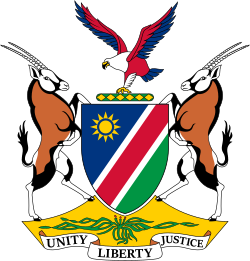 |
|---|
The Seoposengwe Party was a political party in Namibia, representing the Tswana minority in rural eastern Namibia. The party emerged from the Tswana Alliance, a group participating at the Turnhalle Constitutional Conference in Windhoek between 1975 and 1977. [1]
In 1980 the Tswana Alliance was renamed Seoposengwe Party, and joined the Democratic Turnhalle Alliance in the same year. Its only leader was Constance Kgosiemang, paramount chief of the Tswana. [2] Deputy party president during this time was Gregory Tibinyane. [3]
In February 1981 the Ipelegeng Democratic Party (IDP) split off under the leadership of Gates Mootseng. [4] A further split in 1986 resulted in the formation of the Mmabatho People's Party, led by Michael Simana. [5]